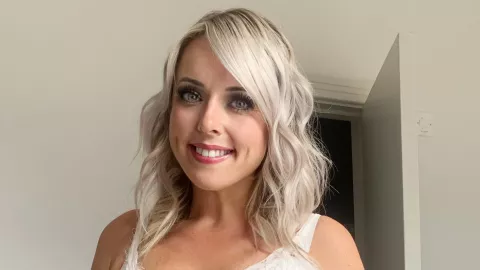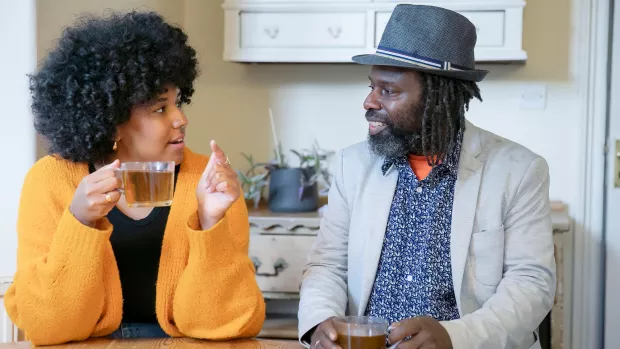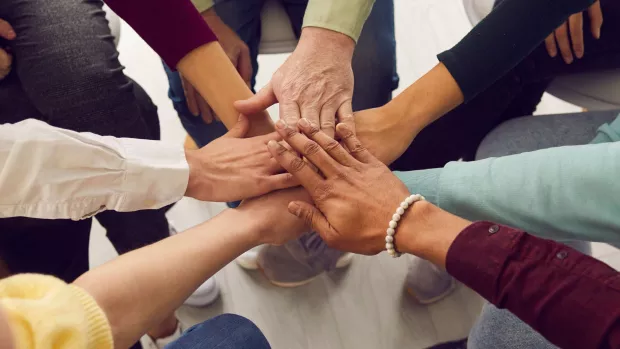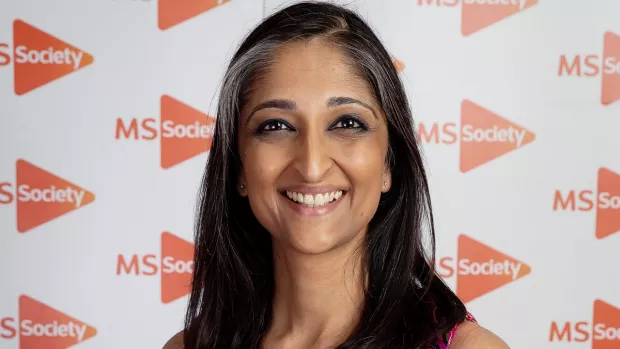
“We won’t get our needs met until we say what they are”
Louise is 35 years old with relapsing remitting MS. She lives in Wales with her partner Martin and their two cats. She's a volunteer Co-Production Champion, encouraging our whole community to shape our services through co-production.
Can you tell us a bit about yourself and your MS journey so far?
I was diagnosed with MS when I was 26. At first, I had optic neuritis in my left eye and was just blinded overnight - I didn’t have a clue what was going on. I went to A&E and they ran the tests but I only had half answers. I felt like I was dangling off a cliff edge just waiting to find out what was happening to me.
I was admitted to hospital for a week and it was the first and only time I've ever called in sick to work. I was a full-time hairdresser doing 40 hours a week until I couldn’t physically do it anymore. Luckily, I was already doing my teaching degree. I say luckily because MS can make you question who you are now and what you can do - especially when you're younger, because you're still forming your identity.
If I hadn’t already started university I think if I would’ve thought “well, I've got MS now so I can't work or go to uni, it’s too much.” I had to grieve my old life and all the plans that I had. But eventually, I worked through it and moved into a new career in teaching.
Can you give us an example of some co-production you’ve been involved in or something you’ve helped change through co-production?
I'm an English teacher and I write poetry for a hobby. I saw MS Society Cymru were running some creative writing workshops and I thought I would really enjoy that. I also thought it might be helpful for me personally, as I’d started writing down my thoughts about my lived experience - like writing a diary.
But all the local events I wanted to go to were during the day when I was at work. For some people with MS, having events during the day is perfect as that’s when they have more energy. But for me, as a younger person in work, that time of day isn’t accessible. So I got in touch with the MS Society and shared my experience. As a result, they added events so there was more happening outside of work hours and on the weekends. The MS community all have different needs and co-production is about making sure everyone’s needs are being met.
Why is co-production important? What difference does co-production make?
When you go on eBay, they sell everything. They don’t know what you want until you add filters to show what you’re looking for. What colour? What size? Used or new? Delivery or collection? Then they show you the exactly the right results for you.
And I think it’s the same with co-production at the MS Society. Until people living with MS sit down and say “This is the information and support we need, and this is how we need it, these are the things that would make life easier for us” it’s just guesswork. We're won’t get our needs met until we say what they are. And if we don't, we're never going to experience the practical changes that we need to live our best lives right now.
I also don't want anyone to go through what I went through. I think of myself 10 years ago, walking into an unknown life that’s just been turned upside down and I’ve got to take a detour. By taking part in co-production, we can change things for the next generation so it doesn't have to be as daunting and frightening. We can help make that detour easier for the next person.
What do you think we should focus co-production on next? Where’s the information and support gap?
One thing I’d like to see more of is support to do with employment. I had to change career, and I think for younger people that can sometimes be the case. You might even be finding your first job with MS. You have to think about reasonable adjustments, and you might be worried. You might think: “if I start if I start a new job and have to take time off sick in the first few months - am I going to get sacked?”
I think people with MS need more information about our legal rights. If you're disabled and you need to go to a hospital appointment, in a lot of workplaces, you just have to take unpaid leave. But if you're pregnant and need time off for appointments I think you get paid leave. There might also be issues around going further in your career. You might hit a “glass ceiling” and find it harder to get promoted or develop.
So, I think we should more around employment - people’s rights, supporting them to have conversations with their workplace, and supporting employers when they have staff with MS.
Do you have MS or care for someone who does? Could you share your experience, knowledge and skills to help shape services for people like you? Our experts by experience newsletter lists all the opportunities to help shape our work.



